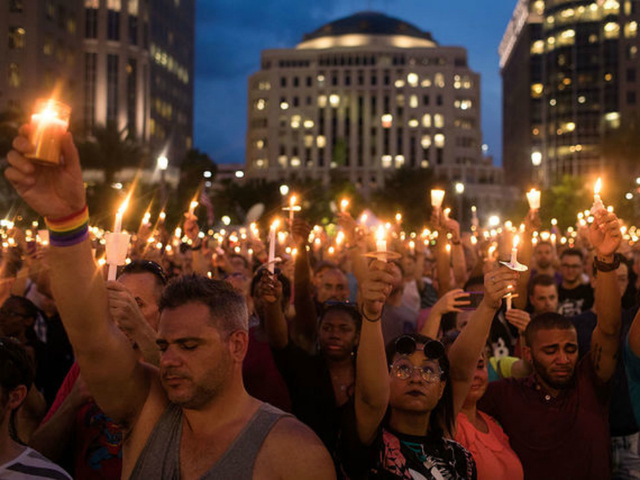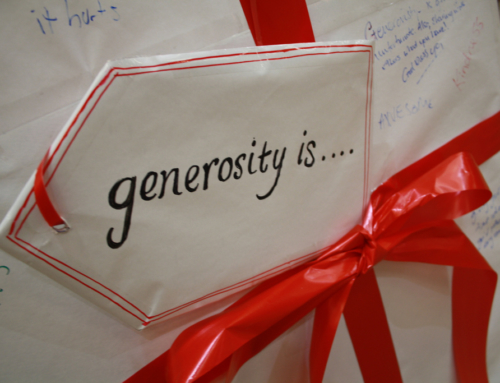By Eddie Pipkin
June 20, 2016
This is an unusual blog. I am writing it from the screened back porch of my home in Orlando (or as I refer to it, my “office”). It is a beautiful, peaceful spot with a lush backyard on a little lake – but for four days earlier this week, the normal peace in which I write was disturbed by the buzz of law enforcement and news helicopters. You see, my home is also two miles from the site of the largest mass shooting in modern American history.
In addition to my role at EMC3, I work for a local United Methodist congregation, so I was at that church getting started on a normal summer Sunday on June 12th as the tragic news from the Pulse nightclub began to filter in. We hold three worship services (8:15, 9:30, and 11:00), and even as the news became increasingly horrific, we were reacting as best we could within the context of those worship gatherings, to offer prayers and comfort to a shocked congregation. This is, after all, an essential role of the church.
I did not know anyone directly who was killed or injured in the attack, but within hours we learned that a young man who had been a leader in our youth group (and later an on-again, off-again adult leader for that group) had been in the club. He escaped uninjured, but understandably traumatized – sadly, he lost two friends there. Many people who are part of our congregation knew friends of friends who were there, who died or were seriously injured, who were first responders, or who were otherwise affected in some way.
And these people (as we all do in these times of local and national crisis) turned to their communities of faith. We responded with a special service of prayer on the Tuesday night after, where people could find comfort and hope. We helped people get connected with candlelight vigils, promoted blood donation, collected snacks and drinks for those at the blood donation centers, and gave our support to one of our young people who designed wristbands to sell to raise money for the OneOrlando fund for victims and their families. We are continuing to speak words of hope and healing and to reach out to communities that sometimes feel marginalized. Many of the churches in our area responded in robust ways. This is the church’s appropriate role as the conduit of God’s grace on this planet.
Many of you remember the aftermath of 9/11, how people turned to their  local churches in droves. That was a truly national tragedy, but we all have similar memories of local and regional incidents from weather disasters to bus accident tragedies that have caused our cities, towns, and neighborhoods to seek solace and a reconnection with God. These events have always been a part of the fabric of life, and they always will be. It serves our churches and ministries well when we have prepared in advance to respond.
local churches in droves. That was a truly national tragedy, but we all have similar memories of local and regional incidents from weather disasters to bus accident tragedies that have caused our cities, towns, and neighborhoods to seek solace and a reconnection with God. These events have always been a part of the fabric of life, and they always will be. It serves our churches and ministries well when we have prepared in advance to respond.
Of course, every such incident is different (a hurricane is very different in character and options for response than a mass shooting – and we have now, sadly, had the opportunity to respond to both here in Orlando), but to the extent that advanced planning is possible, it leads to a better focused and better organized reaction from church leadership. And one of the things people really need in these trying times is a sense that someone has a clear idea of what to do.
Here are some things to think about:
• If you live in an area prone to natural disasters, have a clear emergency plan in place (developed with staff and Trustee input). Such a plan should spell out responsibilities and actions to be taken depending on damage to the church property and needs in the community. Such “predictable” disasters would include hurricanes, tornadoes, earthquakes, snowstorms, wildfires, urban unrest, etc., tailored to your area. (In Orlando, we have a hurricane emergency plan, but not one for snowstorms.)
• Who is in charge of your social media, and how will you utilize social media in a time of crisis? Social media outlets can be used for organizing responses such as blood donations, emergency relief supplies, and monetary donations. They can be instrumental in giving people an outlet for expressing their fears, processing their grief, and connecting with others. They can be an essential conduit for expressing words of hope and comfort. Social media is an immediately accessible tool for people to learn about special worship services, support groups, and how they can get help. Even just a place to share virtual hugs.
• People need a way to respond. This is a critical part of the healing process, so be sure and provide an outlet for that response. Obviously, social media can play an important role (see above), but there are lots of “old school” options: giving people a chance to write on banners or with chalk, giving people a chance to share verbally, providing many opportunities for prayer, offering Scripture passages that are helpful, offering a fellowship dinner where people can just come and be together.
• Know who the critical organizations are in your community when there is a crisis. What agencies and non-profits coordinate a response and communicate important news? With what groups can you coordinate, helping to connect the people of your local congregation with larger entities (either to your parishioners to get the help they need or to offer their own support).
• Develop a basic special worship template for use in times of crisis. If you work with your worship team to think through what such a special service of prayer, remembrance, and special music would look like, it will be much less stressful when the time comes to actually put such a service together. Have a list of leaders and volunteers who are on standby to be the go-to people in such moments.
• Know who the people are in your congregation who are good resources for listening to others and sharing prayer. For people in your congregation who are having a particularly hard time dealing with an incident, it is good to have some strong spiritual guides in mind who can walk with them through this difficult time. You can even build a team of such people and help them with training (and they can be part of a ministry to be available for people who are dealing with the individual traumas of life: issues like grief, divorce, job loss, and family members struggling with addiction). And of course, part of a ministry such as this is knowing when people need professional care and guidance, and being able to direct them to such aid.
• Likewise, knowing who in your congregation has skills (professional or practical) and who is willing to share those skills to aid members of your congregation or community during times of crisis. From lawyers to tree trimmers to financial advisors, different crises produce sometimes surprising practical needs, and it can be a powerful moment to connect someone who is desperate to solve a problem with someone who is eager to do what they can to help.
• Be clear on what your vision and policy is for those who would launch a new ministry or fund raiser. Almost always, in response to a crisis, as people are passionate about helping with dramatic gestures, you are going to be approached with an idea or initiative, a fund raiser or a new ministry. It is very important to know what the parameters are for such new projects within your leadership structure and who needs to be consulted before promises are made or approvals are given. And this is definitely a time when people are primed to hear a “yes, absolutely,” when what you said was closer to a “maybe, let me think about that a bit”. Emotions are running high, and it is the kind of moment when you give a well-intentioned thumbs-up to an idea that becomes unwieldy and unsustainable in the long term. It is tricky to manage the sincere passions of generous-hearted people whose efforts often could be much better coordinated with existing non-profit organizations who specialize in crisis responses.
Remember that shepherding your community of faith through trauma is stressful and can be physical taxing as well. Make a pact with your leadership to support one another, cut one another some slack on inevitably missed deadlines, and take turns to give one another a much-needed one-day-recovery-sabbatical. If you are dealing with a crisis, don’t forget to debrief your response once everyone has had a chance to catch their breath. And if you are blessed to be in a period where no immediate crisis is at hand, take time in a staff or leadership gathering to share hypothetically how you would respond.
And, please do keep the people of Orlando in your prayers. We need them!
What have you learned about dealing with crises in your own ministry setting? What have you seen handled well? What have you seen that might have been handled with more sensitivity or better organization? Use the comments section to share your experience.







Leave A Comment